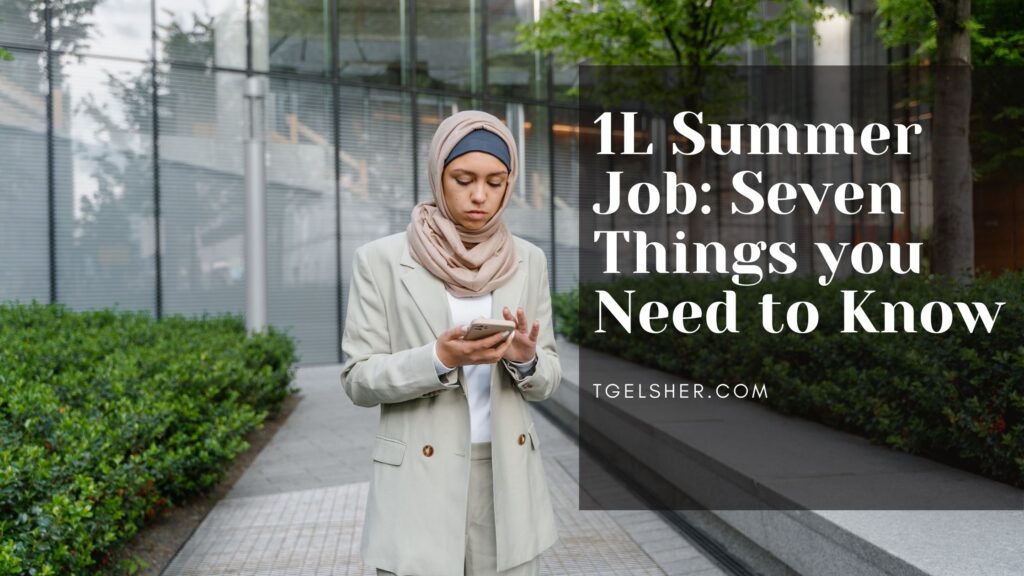If you are like most first-year law students who haven’t yet secured a 1L summer job, you are probably feeling pretty anxious. I’m here to tell you not to worry.
Though it seems your classmates all have work this summer, they don’t. And sometimes taking a job too early can hurt your chances of getting the job you want.
Here are some practical tips to keep in mind during your 1L summer job search.
You Still Have Plenty of Time to Find a 1L Summer Job.
It isn’t even March yet.
While some employers start hiring early, many employers do not begin their summer hiring cycle until early March or later.
One reason for this is that many employers want to see all of your first semester grades before making hiring decisions.
At some schools, all of those grades may not have been released yet.
Another reason is that most smaller employers do not have a recruiter or a dedicated hiring person. Their hiring is typically handled by an attorney at the company.
So, even though they may intend to begin the hiring process early, many employers get caught up with casework and end up conducting a job search later in the season.
March is a great time for employers to start their hiring process for that reason.
You’ll Need to Apply to More Places than you Think.
Most first-year law students are shocked by the number of applications they have to send out to secure their 1L summer job.
One first-year recently posted on Reddit:
I’ve got 47 rejects for this summer now.
u/bberniceeo_o
The response was overwhelmingly supportive, and students affirmed that it is “just a numbers game.”
One user responded:
True story: 50ish rejections for 1L summer. Finally ended up with something in May through a referral by a professor. Got a v5 biglaw summer associateship for 2L summer.
fmoss
It isn’t unusual to face a lot of rejection during your 1L job search.
There are a couple of reasons for this:
- Not every rejection is a true rejection: unfortunately, employers don’t always keep their posts up-to-date. The employer may have hired someone else before you applied. They may have decided not to hire after all. Or they may have already had someone in mind but needed to post the position because of internal policies.
- There is a lot of competition: 1Ls tend to worry that they won’t get a summer position, so everyone rushes to apply to the positions that are posted early.
- Many employers want 2Ls: Some employers will express a desire for either a 1L or 2L but end up hiring the 2L because they generally have more skills with research and writing.
This doesn’t mean you won’t find a summer job or that you should stress about it.
Instead, it means that you’ll have to apply to more places than you think.
It’s also normal to feel demoralized during this process. This is an unusual amount of rejection for anyone to face, especially after surviving the first semester of law school.
Remember that most students experience this, and this isn’t indicative of your candidacy or future career.
Keep in mind the quote above: 50 rejections 1L year, but a Big Law job for 2L summer.

You’ll Need to Think Outside the Box.
A lot of students rely heavily on On-Campus interviews (“OCI”) to find their summer job.
But OCI isn’t the only way to get a job, and it is rarely the best way for a 1L to find summer employment.
OCI gets a lot of publicity, but most large law firms do not hire 1Ls into their summer associate program. And if they do, they hire very few 1Ls.
In addition to this, 1L OCI programs tend to be fairly small. They are a great way to practice for 2L OCI season, and there are often great opportunities for 1Ls. But you shouldn’t rely on them exclusively.
In addition to OCI:
- Use your law school’s job bank: This tends to be a pretty underutilized resource at many law schools, and there tend to be more opportunities in March and April.
- Apply directly to employers (Judges): It might be a bit late to begin applying to federal judicial internships. (Or it might not; every region is a little different. You should check with your career advisor and/or call chambers to inquire whether the judge is still accepting applications for summer 2022 internships.) And don’t forget about state judges. Many circuit courts have special dockets, like a business docket or a family docket. And, of course, there is always the appellate courts.
- Apply directly to employers (Corporations): Many corporations post their paid summer internships online at sites like indeed. In this post, I highlight three examples that were current as of February 19, 2022. But these are only three examples. You’ll likely find many more in your region of interest.
- Apply directly to employers (Public Interest): You can use sites like PSJD jobs to find public service opportunities.
- Don’t forget clinics and school facilitated internships and externships: Many schools offer clinics and internships/externships during the summer semester. These positions are generally unpaid, but students can get credit for these and list them on their resumes just like any other position.
Use your Resources to Help you find a 1L Summer Job.
If you are still seeking work, let your career advisors and mentors know.
Career advisors tend to have the inside scoop on job opportunities.
They also often have relationships with employers. So if you’ve made a good impression on your career advisor, she may be able to give you a recommendation.
If you have a 2L or 3L mentor or friend, let them know. They may have left a good impression on their previous summer employer and might be able to recommend you.
I’ve seen quite a few students get jobs this way.
Finally, If you have a great relationship with one of your professors, tell her you are seeking summer work. Many professors hire research assistants over the summer.
And many of your professors are experts in certain areas. If that professor is an expert in your area of interest, even better.
Listing your research position on your resume can help focus your experience on an area that interests you.
If you are interested in Big Law, for example, consider reaching out to a professor who teaches a business course, like Corporations.
Make sure your Application Materials are Strong.
If you’ve been applying for a couple of months without success, now is a great time to review your materials again.
Now that you’ve had time away from them, you will be better able to proofread and spot errors.
If you’ve not done so already, you should also bring your resume and cover letter to a career advisor.
She can help you tailor your materials for the type of employer that interests you.
You should also review your writing sample for formatting, grammatical, and typographical errors.
Some of the common mistakes I’ve seen in writing samples that drive me nuts are:
- The body of the writing sample is in Times New Roman, but the page numbers are in a different font.
- The tabs are uneven, meaning some paragraphs are indented farther than others.
- There is extra spacing between paragraphs.
If anyone would like a tutorial post on common writing sample mistakes and how to fix them in Word, please let me know in the comments below.
Make sure your Legal Interview Skills are Strong.
A lot of students fall into the trap of thinking legal interviews are like other interviews. Unfortunately, they are not.
Legal interviews tend to be far more intense, and they require a lot of preparation.
In this post, I list the most common OCI questions, but a lot of these apply to all legal interviews.
You can also check out this post, where I discuss how to prepare for OCI. Again, most of the tips relate to any legal interview.
Most career development offices offer mock interview programs or your career advisor will offer you a mock interview.
This is a great resource that you should utilize. It helps to speak your answers aloud in practice before the real deal.
Finally, as you may know, I authored the On-Campus Interview Success Series–more books/chapters are forthcoming.
This book teaches students how to answer five of the most common OCI questions. It’s only $0.99 and free with Kindle Unlimited, so please head over to Amazon and check it out.
Don’t Make Fear-Based Decisions Regarding your 1L Summer Job.
Thinking of accepting a position that you are not at all interested in because you are afraid you won’t get something else? Please reconsider.
Fear-based decisions can really hurt your career.
Your 1L summer isn’t going to make or break you, so please put too much pressure on yourself.
But at least talk to a career advisor or another expert in your market before accepting a job out of fear. She will have a pulse on hiring and will be able to tell you whether other opportunities are likely to come down the pipeline.
She might even know of opportunities that would be better suited for you.
Again, you still have plenty of time to solidify your 1L summer job. So take a deep breath, and focus on the tips in this article.
If you liked 1L Summer Job: Seven Things you Need to Know . . .
Check out Seven Things I Wish I’d Known Before Law School, and hit the like button below!






